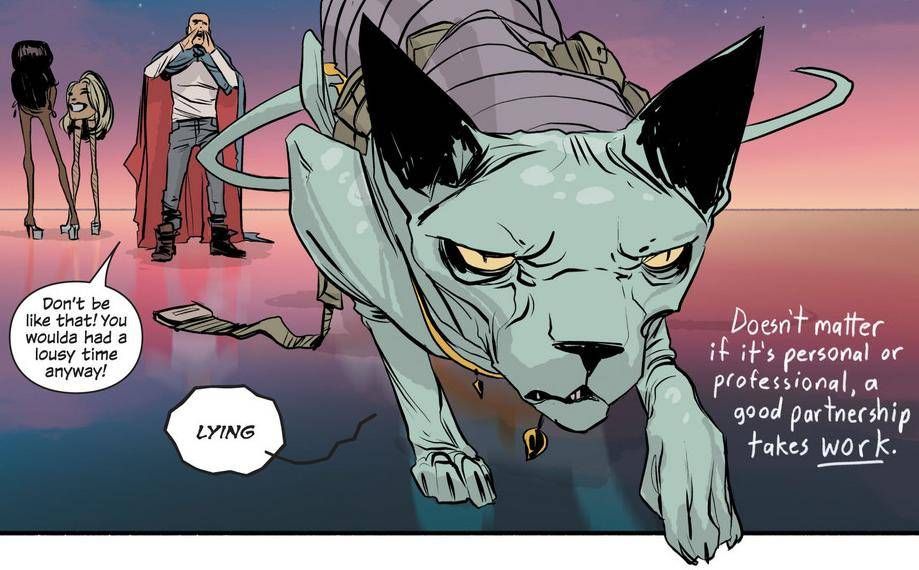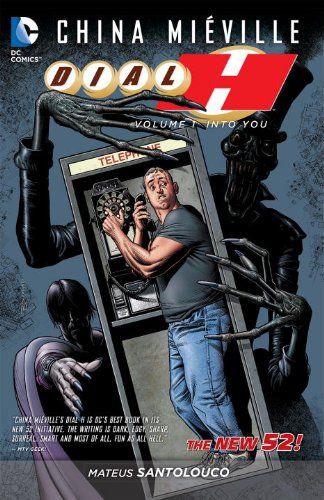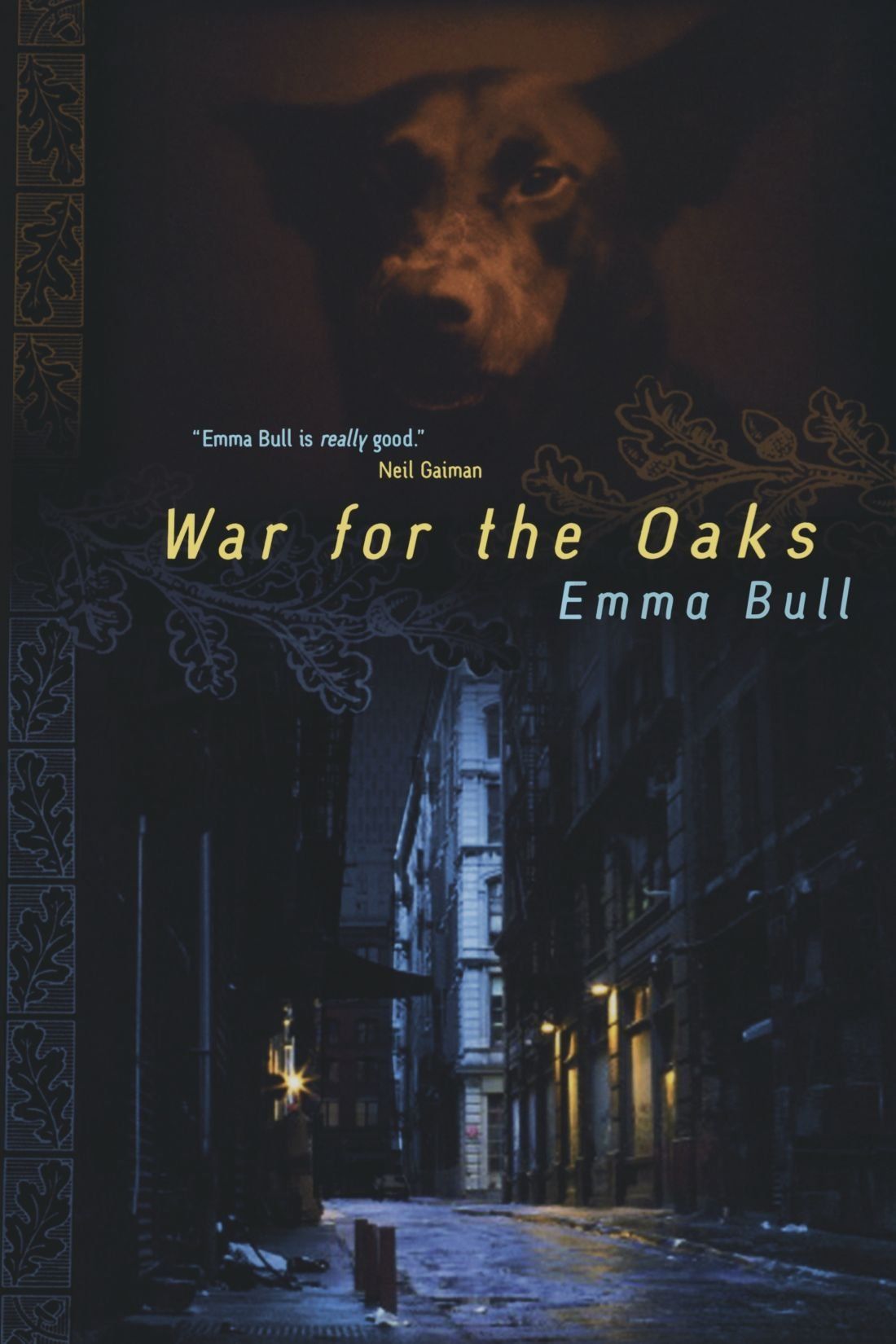This will not be a post about how Saga is awesome. I've written 30 of those already. No thrilling over Lying Cat here, no desperation for the next issue, none of my hopes to see The Will return to action or for [SPOILER] to [SPOILER] and [SPOILER SPOILER SPOILER].
Nor will I lose my cool over the fact that, right now, my bookshelf contains two excellent and weird and hilarious China Mieville (China Mieville!)-penned trades of Dial H, complete with blink-and-you'll-miss-'em anti-MPAA digs. Or that Neil Gaiman, in the – yikes -- almost two decades since I picked up my first Sandman trade, has evolved from Sensational Comic Book Writer Neil Gaiman to MechaGaiman, Devourer of Worlds, Savior of Publishing and Champion of Art. Or that Genevieve Valentine is writing Catwoman!
I won't flip out about The Wicked + The Divine or Chew or either Marvel, Ms. or Captain.
Probably.
This will be a sober, squee-less, well-reasoned and theoretical treatment of the cross-pollination between comic books and science fiction and fantasy literature in the early 21st century. I promised myself I would use words like transmedia. An early draft of this essay quoted David Foster Wallace, dammit.
Oh, who am I kidding?
The first hardcover book I ever bought on release day was Neil Gaiman's American Gods. I blew a night's wages in the dish pits of middle Tennessee to leave a shoebox university bookstore with that hardcover tucked under my arm.
I felt I was breaking some unwritten rule: buying a novel by a writer of comics! Whodathunk?
I wasn't, of course, even back then. American Gods was not Gaiman's first novel. Writers of science fiction and fantasy wrote comics, and vice versa. I knew Peter David as an author of Star Trek tie-ins long before I realized he also wrote one of my favorite runs of The Incredible Hulk.
But the world has opened in the last 20 years. I mentioned China Mieville's run on Dial H and Valentine's on Catwoman; I haven't yet brought up Mike Carey's Felix Castor novels, or Chuck Wendig and Adam Christopher, both excellent prose writers, tackling S.H.I.E.L.D. Or G. Willow Wilson and Joe Hill, for whom the line between prose fiction and comics seems nonexistent (let alone TV-comics-prose-omnidirectional virtuosos like Paul Cornell, who would no doubt write heartbreaking masterpieces for kitchen sinks if they came with narrative functionality).
On a certain level, no wonder talents cross over: The stories themselves won't stay put. Thirty-year-olds in 2014 grew up with the Teenage Mutant Ninja Turtles as an animated show, two films (what's that you say? Turtles in Time, you say? Permit me to FEED YOU TO THE SHARKTICONS), at least two lines of comic books, a tabletop role-playing game and a handful of Nintendo games. Stories leap from one medium to the next and retain some of their essential element — why shouldn't writers?
And of course there are solid market reasons writers cross over. Publishers like proven quantities — a career in either comics or prose offers a writer fans to carry to her next venture. Even writers without immense fan bases bear a stamp of pre-approval: Someone else has done the hard work of judging this person worthy! And from the writers' perspective, well, writers are a hungry bunch.
But motives run deeper than mere mercenary gleam. (Not that there's anything wrong with mercenary gleam, mind!) Writers write, but writers read too — most of us grew up reading everything that wasn't nailed down, and when we found stuff that was nailed down we went looking for crowbars and pry hammers. Today's mid-career writers grew up in a world after 2000 AD. V for Vendetta's 30 years old, and so's Dykes to Watch Out For. Maus is 23, and a film about Harvey Pekar won an Oscar, and NPR interviewed R. Crumb about Genesis, and in general an assertion that comics aren't serious literature these days seems as quaint as a claim color ruined cinematography. Love for comics starts early, long before readers reach the whiskey-stiff stuff; yes, I trot out The Maxx when I want to talk depth and influence and Jung, but I read Carl Barks and Calvin and Hobbes first.
Writers who read both SFF and comics naturally draw from the stories they love. Mainstream U.S. superhero comics' focus on superhuman life and the special-case ethics (or lack thereof) invited by massive wealth disparity (coughcoughTonyStarkReedRichardsBruceWayneVictorVonDoomcough), have informed science fictional explorations of posthumanity and dystopia. The superhero trope of the well-defined and inventively used power set has become a central feature of modern fantasy — the “magic system” owes as much to the X-Men as to Robert Jordan. And of course ideas from science fiction and fantasy are all over comics — time travel, dystopian futures, space colonies. E.E. “Doc” Smith's Lensmen are kissing cousins to the Green Lanterns. My beloved Saga walks on ground paved by Frank Herbert and Kurt Vonnegut and Samuel R. Delany, by Roger Zelazny and Ursula K. Leguin. The Wicked + The Divine stands on the shoulders of a tradition of rock ‘n’ roll urban fantasy going back at least to Emma Bull's War for the Oaks.
The two mediums have a great deal more to offer one another than story hooks and setting elements — because creators in each feel a great deal of pressure to tell stories that are fun, but also make the world better. Transmetropolitan, in repurposing Hunter S. Thompson's life and the political history of the U.S. 1970s as a madcap cyberpunk dystopia, argues for the duty of traditionally escapist pulp to confront political reality, bowel-disruptor in hand. Pulp must have purpose, but purpose shouldn't lack joy or fun. Planetary, likewise, reads its own genre critically from within, confronting and overturning its tropes and internal logic — the same project to which science fiction classics like Dhalgren are dedicated. On the prose side, books like Anne Leckie's Ancillary Justice and MJ Locke's Up Against It draw on space-opera roots while presenting heroes and villains of a wide range of genders, sexualities and backgrounds — much as Kelly Sue DeConnick's Captain Marvel has in many ways returned to four-color superhero adventure while remaking Carol Danvers as a feminist icon.
At the dawn of 2015, as superhero culture mainstreams and comic after comic bounds into cable, further cross-pollination between prose and panel seems inevitable. While prophets weekly proclaim the imminent death of novel and novelist, more people are reading books than ever — and writers of books, of games, of comics and of movies seek inspiration where they can find it. Some purists may reject crossover characters, styles, and ideas, but when it comes to the shifting influence between mediums and genres, well — next year is the 50th anniversary of the publication of Dune, and Frank Herbert's never seemed quite so prescient in the name he chose for the spice that controls the universe: mélange.
A two-time nominee for the John W Campbell Best New Writer Award, Max Gladstone is the author of The Craft Sequence series of fantasy novels. The fourth installment, First Last Snow, will be published in July by Tor Books.



